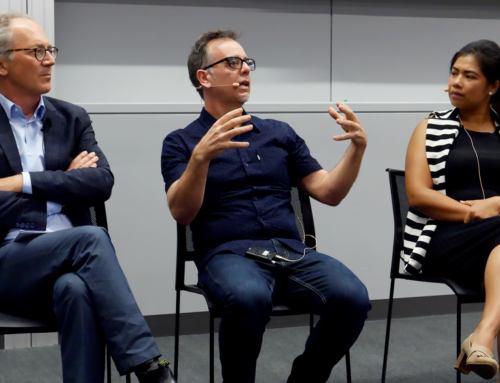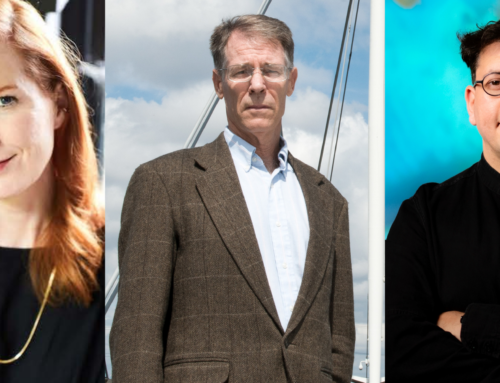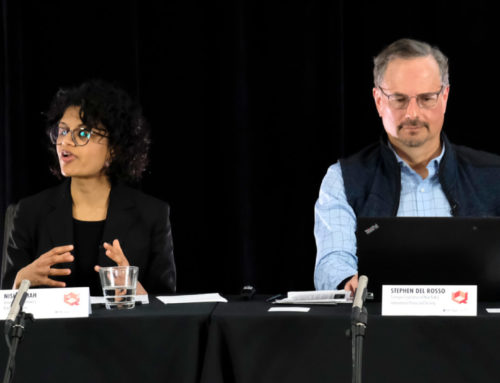Those at the Q Symposium would be forgiven, given the breadth and depth of research presented over the day and a half prior, for wondering how so much could be packed into such a short time as Saturday slunk softly towards sundown. Panels had touched on so many facets of security studies, natural and social science, ethics, epistemology, and security aesthetics that a single closing panel would have to serve more as a pledge for future research than a summation of conclusions.
CISS Director and Q Symposium organizer James Der Derian opened the closing with a series of questions. Do quantum considerations prompt new considerations of agency and accountability? Is the quantum turn an epistemic breach or an epochal evolution? Is quantum just a new metaphorical heuristic in a field long renowned for using the language of the natural to describe the social? Perhaps consideration of a quantum age or turn misses an epistemic shift from the age of longue durées to a world of simultaneity and entanglement in which the actualization of Virilian acceleration towards the global event has made local global and here indistinguishable from there.
While none of these questions could be answered conclusively, those seated around Final Q Table—Tom Biersteker (Graduate Institute of Geneva), Lene Hansen (University of Copenhagen), and John Keane and Colin Wight (both of the University of Sydney)—spoke to elements and aspects of some or all of these and other questions put forth by other presenters. The first three spoke of the impacts of quantum considerations on their own research, while Wight took the opportunity to launch a welcome questioning of Q itself.

The Q Final Table. From R to L: Colin Wight, John Keane (both of University of Sydney), Lene Hansen (University of Copenhagen), Thomas Biersteker (Graduate Institute of Geneva) and James Der Derian (University of Sydney). (Photo: Jose Torrealba)
Biersteker opened his remarks by recounting a course he gave at Brown with Leon Cooper, a Nobel Laureate in physics famous for his contributions to theories of superconductivity. The course was built around Copenhagen, Michael Frayn’s popular play based on Werner Heisenberg’s visit to his former mentor Niels Bohr and his wife, Margrethe, during the Nazi occupation of Denmark in 1941. The play reconstructs the visit through the eyes of its three protagonists in a Rashomon-esque re-telling of the visit, a long-running source of controversy among historians and physicists who have used accounts and recollections in attempts to determine Heisenberg’s culpability in Nazi efforts to develop a fission weapon. Over the course of their discussions, Biersteker recalled Cooper’s skepticism towards political science’s pretensions towards scientific rigor, asking Biersteker of the positivism dominant within the discipline, “How could they call that scientific?”
The experience of the course and these conversations clearly left their mark on Biersteker, who then spoke of his recent return to a research program of dialectical inquiry. This work began in 1984, with his publication of “The Dialectics of World Order” with Hayward Alker Jr. which conceptualized IR as a “global interdiscipline” arrayed around a triad of traditional, radical, and behaviorist paradigms. The coming end of the Cold War and its triumphal “end of history” for many within the American parochial paradigm of IR scholarship likely allayed the research program, but the uncertainty and apparent disorder of the potentially post-American century has pushed Biersteker back towards the topic, pushing him towards developing a “Modern Open Dialectics” grounded in open-ended knowledge accumulation guided by three primary commitments and focuses: persepectivism, interconnectedness, and the interplay between theory and practice.
Though Biersteker did not have time to extrapolate much further, it is not difficult to see the links between this project and elements of the potential quantum turn. Perspectivism, the Nietzchean notion of ideation and truth claims shaped by different perspectives, is not dissimilar from the notion of Copenhagen complementarity, based on the understanding that the means of observation impact the phenomena itself. Interconnectedness calls to mind entanglement and the inability to describe entangled particles independently as observation of one leads to the other “knowing” the effect on the shared quantum state with no observable means of “transmission” between the particles. And what is the Q Symposium if not a dialectic space between theory and practice?
Lene Hansen then took to the microphone as Q’s inquisitor, providing a bookend to the conference she had opened with her Hintze lecture two days prior. Inspired by the impressive rock carvings left by Q Station’s quarantined “guests” in an earlier era, she wondered aloud what inscriptions we would be leaving at Q. Picking up on the theme of both her lecture and research presented by Roland Bleiker in the Infosecurity panel and Megan MacKenzie in the Global Security panel, she saw the confluence of words and images in a novel ontological complementarity for security studies. For her, a “quantum” security studies represented a space of interdisciplinary complementarity and new fundamental questions.
The result was not solely a quantum age of study but a quantum approach, a grouping of considerations and concepts by which to widen and deepen the field. Rooted in her groundbreaking contributions to the Copenhagen school, she analyzed the impact of the conference’s ideas on the practices of securitization. “Security” is a heightened discursive status, constructed by global politics, technology, events, academic debates, and institutionalization.
She then turned to the notion of the global. Does the global event exist? How do events “become” global? She stressed again the power of images, with the technological advances in production, diffusion, and consumption necessitating her recent focus. What collectives and identities are formed in potentially global events? The setting of the quarantine site at Q Station, a place where nationality and class considerations were once of critical concern, served to remind those in attendance to consider just whose subjectivities are being constructed and how. The academic debates on methodologies and the boundaries of concepts like “human security” touched on at Q and elsewhere are pushing security studies to these kinds of frontiers in attempting to answer these kinds of questions.
This emphasis on collectivities and identities provided a great segue to John Keane’s thoughts on quantum democracy. He described his experience at Q through a brief re-telling of one of Niels Bohr’s favorite jokes. A young man is sent from his shtetl to hear a great rabbi speak and report back. “When he returned he said, “The rabbi spoke three times. The first talk was brilliant; clear and simple. I understood every word. The second was even better; deep and subtle. I didn’t understand much, but the rabbi understood all of it. The third was by far the finest; a great and unforgettable experience. I understood nothing, and the rabbi himself didn’t understand much either.’” (taken here from Aage Petersen’s 1963 article “The Philosophy of Niels Bohr” in The Bulletin of the Atomic Scientists). But while he may not have understood all of what had been said at the conference, Keane did understand the significance of what he had not heard: much discussion of territorial sovereignty.
This silence spoke volumes about the present state of democracy across the world. Keane mentioned that in his recent investigations of a range of justifications for democracy, he estimated that 95% or so were no longer persuasive. Traditional conditions of inside/outside, sovereign exclusivity, and the like no longer maintain (if they ever truly did) while cross-border, extraterritorial “butterfly effects” and post-sovereign pressures on the state are now the norm. What Keane described a “deep-seated territorial mentality” characterizing the assumptions of a majority of democratic theory continues to lead many theorists to treat this new normal as anomalous exceptions. His thoughts mimicked Bohr’s reflections on the implications of the quantum turn, “The great extension of our experience in recent years has brought to light the insufficiency of our simple mechanical conceptions and, as a consequence, has shaken the foundation on which the customary interpretation of observations was based, thus throwing new light on old philosophical problems.” (from Bohr’s 1934 Atomic Theory and the Description of Nature)
For Keane, it became clear that quantum considerations allowed for a different conception. Making metaphors from the physical sciences as Hobbes had with Newton and Marx did with Darwin, Keane borrows from Bohr and the Copenhagen interpretation terms like entanglement, quantum weirdness, indeterminacy, and non-linearity to make sense of what he sees in a changing political multi-verse needing new conceptualizations of democracy. He proposes a kaleidoscopic, de-territorialized democracy of multi-verses in which entangled democratic spaces of different sizes, functions, and foci are capable of accommodating the politics of units ranging from the sub-atomic particles of individuals to those of the entire planet and beyond. Seeing the need for a “quantum turn” able to account for new experiments in the exercise of power and its restraint at both local and trans-global levels, Keane cited the example of the Forest Stewardship Council– an international regulatory body with a three-chamber structure and rights of representation for different global constituencies emphasizing the integrated futures of humanity and the biosphere. These new spaces and forms might require a new ethics as well, with Keane making mention of Elaine Scarry’s work (presumably with Thinking in an Emergency and the recent publication of Thermonuclear Monarchy in mind) as a potential setting-off point. While time considerations prevented any further digression, Keane has since developed the ideas he first presented at the Final Table; a talk similar to that given at Q was recorded for the Sydney Democracy Network and is available to watch here.
Q had prompted plenty of provocative questions, but Colin Wight closed the panel by turning the lamp on Q itself. Cutting right to the heart of the matter, he opened by asking simply: “Why should we bring quantum in to the discipline?” He mentioned the importance of keeping up on developments in the physical and natural sciences, the potential applications of quantum principles as a means of control over society, and the fundamental links between understanding uncertainty and understanding security. He expressed some familiarity with the issues raised at Q and elsewhere, namely Alexander Wendt’s forthcoming book-length project, tentatively titled Quantum Mind and Social Science.
Wight implored to the room the importance of keeping a few potential problems in mind in order to keep consideration of quantum tunneling from turning to methodological myopia. First and most obvious, he stressed, is that natural science is empirically verifiable. What interests social scientists isn’t necessarily explanation and identification per se but rather the meaning of social phenomena. The social, he continued, can only be explained at the level of the social. What needs consideration then is how, or if, quantum principles affect the social.
He continued on to two practical concerns. Wight pointed out that there are over 25 different interpretations of quantum mechanics. Just what interpretations are we borrowing and how do we make these decisions? Secondly, the social sciences have a dubious history of attempts to appropriate natural science. From behaviorism run rampant to the spectacular scorching of the Sokal affair, social scientists must be on guard against the siren songs of science envy.
Pointing out that conceptual slipperiness had already made itself apparent at Q, Wight explained that complexity theory, elements of which had been drawn on most prominently in the earlier presentations of Jairus Grove and Rebecca Adler-Nissen, is pronouncedly different from quantum mechanics. Complexity theory focuses on closed (albeit complex) systems, in which change is accounted for not through reductionism but from emergence and adaption from within the system. Alternately, quantum mechanics deals with open systems. Reemphasizing that we need to be careful in our appropriation, Wight answered those who spoke of quantum as a metaphor by pointing out that “metaphor is never just metaphor”– as many in international relations are all too familiar, our appropriations often bring along a host of ontological and epistemic assumptions.
With all this being said, Wight did see some room potentially for quantum in the field. Quantum can help explain interconnectedness and entanglement, probabilistic thinking could cope with states of seemingly entropic precarity and entanglement may prove complementary to considerations of intersectionality. With this in mind, Wight proposed Q end on a note of complementarity, a “democracy of ontological insecurity”. Like physics had with the concurrent developments of Einstein’s relativity and Bohr’s Copenhagen interpretation and their successors, IR may well benefit from a similar state of affairs. With that, the Q Symposium concluded as participants left with plenty on their minds as they headed to the beach to take in the lovely Pacific sunset.









[…] Beach), Jairus V. Grove (University of Hawaii, Manoa), Alexander Wendt (Ohio State University), Colin Wight (University of Sydney), Shohini Ghose (Wilfrid Laurier University) and Stephen Del Rosso (Carnegie […]
[…] lecture by Lene Hansen on images in security spoke to themes that would recur throughout the conference, McKenzie Wark’s lecture “Exit to the Planetarium” was the perfect spark for getting a […]